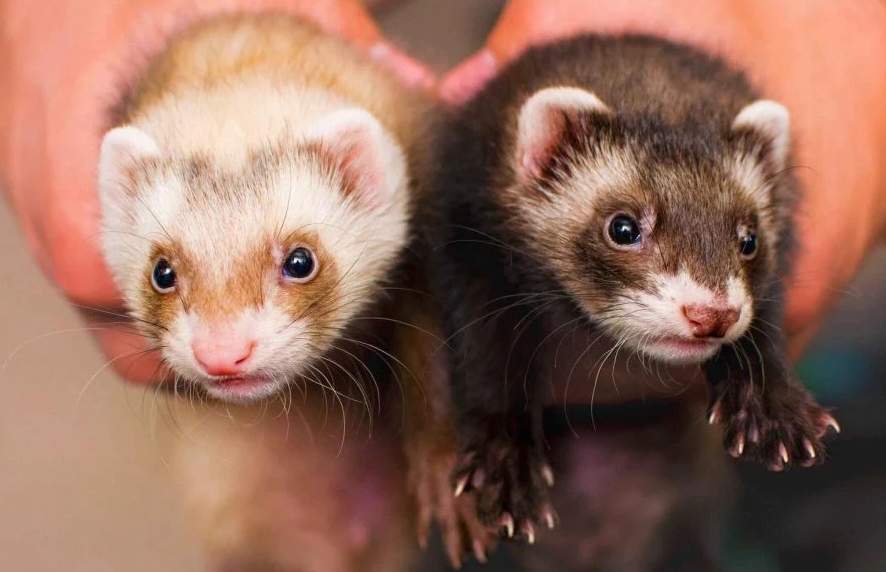Ferrets are fascinating creatures that make great pets. They are small, cute, and have long, slender bodies. Ferrets love to play and explore, which makes them very entertaining pets. They are also very social animals and enjoy the company of humans and other ferrets. Ferrets are intelligent and can be trained to do tricks. In this ultimate guide, we will cover everything you need to know about ferrets as pets.
Introduction of Ferrets Guide
Ferrets are small and cute animals that belong to the weasel family. They have long and slender bodies, sharp claws, and sharp teeth. They are known for their playful nature and inquisitive personalities.
Why ferrets make great pets
Ferrets make great pets for several reasons. Firstly, they are very social animals and enjoy the company of humans and other ferrets. They love to play and explore, which makes them very entertaining pets. Additionally, ferrets are very intelligent animals and can be trained to do tricks and respond to their owner’s commands.
A brief history of Ferrets as Pets
Ferrets have been kept as pets for thousands of years. They were originally bred for hunting rabbits and rodents, but over time, they became popular as pets. Ferrets were first domesticated in Europe, where they were used to control rodent populations in homes and farms. In the United States, ferrets were initially used for research purposes, but they soon became popular as pets in the 1970s. Nowadays, ferrets are one of the most popular exotic pets in the world.
Physical Characteristics
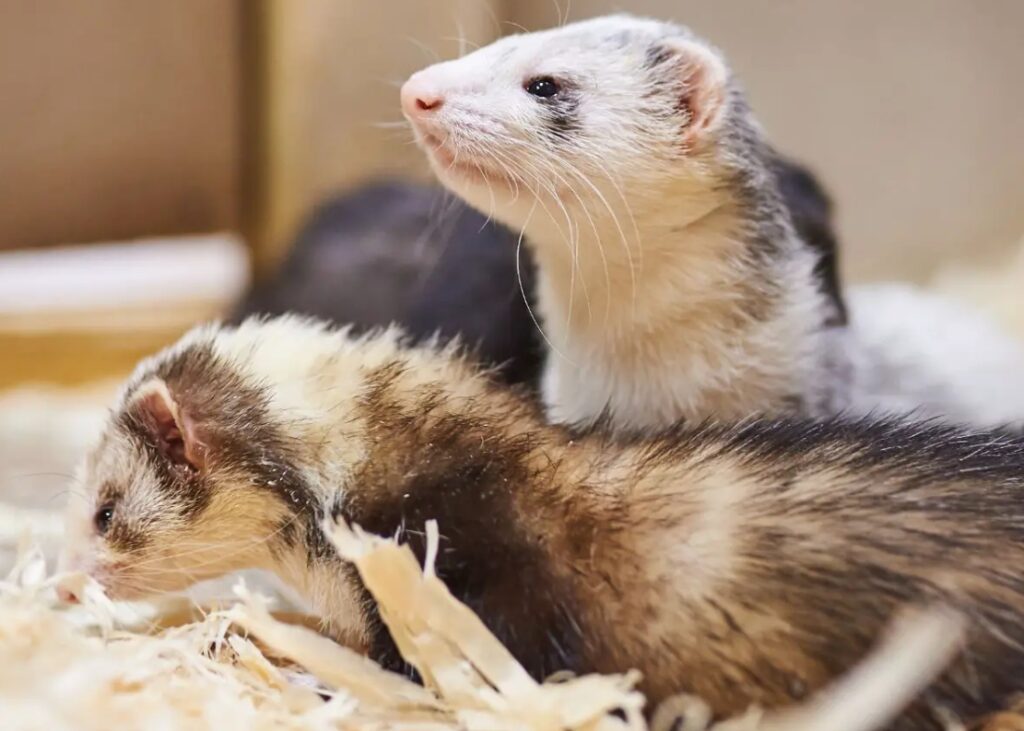
Ferrets are fascinating animals with unique physical characteristics that make them great pets. In this section, we will cover their size, appearance, and differences between males and females.
Size and Appearance
Ferrets are small animals that typically weigh between 1 and 5 pounds. They have a long, slender bodies with short tails and short legs. Ferrets have a pointed snout and small, rounded ears. Their fur is soft and dense, with a range of colors including white, black, brown, and mixed patterns.
Differences Between Males and Females
Male and female ferrets have some distinct physical differences. Males, also known as hobs, are generally larger than females, also known as jills. Hobs have broader heads and thicker necks, while jills have a more slender body shape. Additionally, unneutered males have a strong musky odor, while females do not.
Spaying or neutering your ferret can help reduce its odor and prevent health problems later in life. It’s important to note that spaying or neutering your ferret can also impact their behavior and personality. Speak with your veterinarian to determine the best course of action for your furry friend.
ferrets are unique and fascinating animals with a range of physical characteristics that make them great pets. Understanding their size, appearance, and differences between males and females can help you provide the best care possible for your furry friend.
Behavior and Temperament
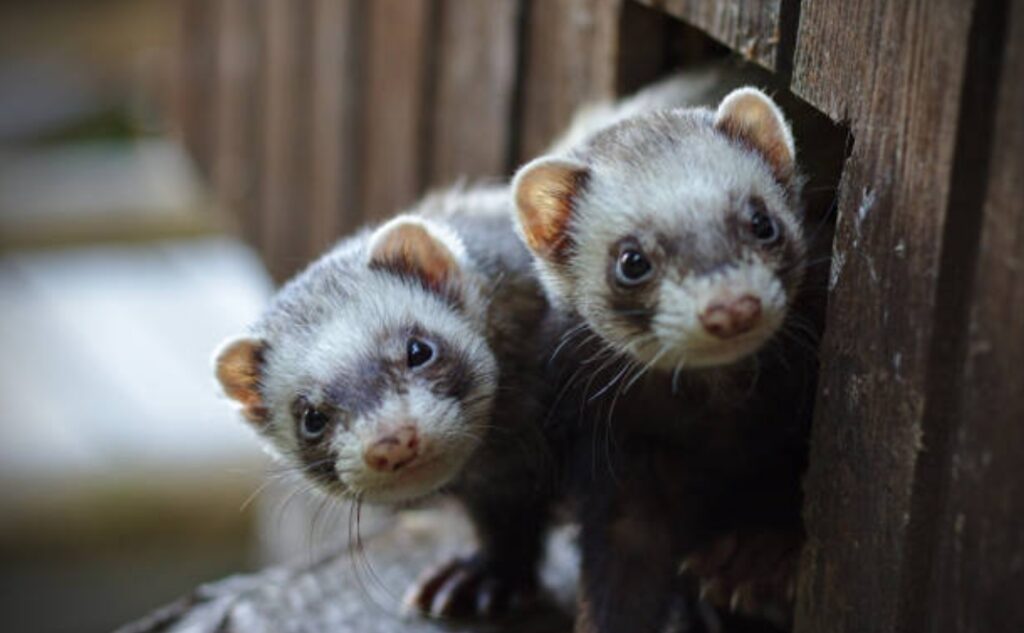
Ferrets are playful, curious, and social animals that have unique behaviors and instincts. In this section, we will cover their natural behaviors and instincts, as well as their unique personality traits.
Natural Behaviors and Instincts
Ferrets have several natural behaviors and instincts that are important to understand as a pet owner. They are active animals that require plenty of playtime and exercise. Ferrets are also explorers and love to investigate their surroundings, which can sometimes lead to mischief if not properly supervised.
Ferrets are also known for their burrowing instincts and enjoy digging and tunneling. It’s important to provide them with a safe and appropriate place to dig, such as a designated sandbox or digging box.
Unique Personality Traits
Ferrets have unique personality traits that make them special and lovable pets. They are affectionate and enjoy spending time with their owners. Ferrets also have a mischievous and playful side, which can make them very entertaining to watch.
Each ferret has its own personality, and it’s important to spend time getting to know your furry friend’s likes and dislikes. Some ferrets may be more outgoing and adventurous, while others may be more reserved and shy.
Ferret Care Basics
Ferrets are delightful and unique pets that require specific care to ensure their health and happiness. In this section, we will cover the basics of ferret care, including housing and bedding, diet and feeding schedule, and exercise and playtime.
How to Take Care of a Ferret: 7 Essential Tips for Beginners
Housing and Bedding
Ferrets need a safe and comfortable living environment. A multi-level cage with plenty of room for play and exercise is ideal. The cage should be lined with soft bedding material, such as fleece or towels. Avoid using cedar or pine bedding, as it can cause respiratory problems for ferrets.
Ferrets are naturally clean animals and need a litter box in their cage. The litter box should be cleaned daily to prevent odors and the spread of disease.
Diet and Feeding Schedule
A healthy diet is essential for the well-being of your ferret. Ferrets are obligate carnivores and require a diet high in protein and fat. Commercial ferret food is available and can be supplemented with fresh meat, such as chicken or turkey.
Ferrets should be fed several small meals throughout the day to prevent hypoglycemia, a condition that can occur when blood sugar levels drop too low. Fresh water should always be available in a spill-proof bowl.
Exercise and Playtime
Ferrets are active and playful animals that require plenty of exercise and playtime. They should be allowed out of their cage for several hours a day in a safe and supervised environment. Ferrets love to play, and toys such as tunnels, balls, and stuffed animals can provide hours of entertainment.
It’s important to ensure your home is ferret-proofed, as they have a tendency to get into everything. This includes covering electrical cords, removing toxic plants, and securing cabinets and drawers.
Health and Wellness
Ferrets are generally healthy animals, but they can still experience health issues. In this section, we will cover common health issues and prevention tips, signs of illness, when to seek veterinary care, and regular grooming and hygiene practices. Ferret – Wikipedia
Common Health Issues and Prevention Tips
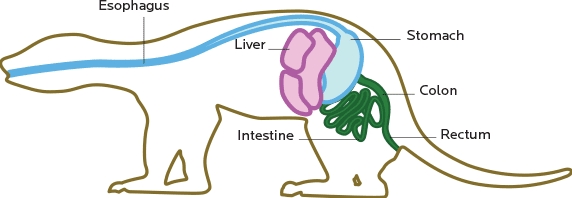
Ferrets can be prone to several health issues, including adrenal disease, insulinoma, and dental disease. These conditions can be prevented or managed through regular veterinary check-ups, a balanced diet, and proper hygiene practices.
It’s important to keep your ferret’s living environment clean and sanitized, as well as to provide plenty of fresh water and exercise. Regular vaccinations are also recommended to prevent diseases such as rabies and distemper.
Signs of Illness and When to Seek Veterinary Care
Ferrets are experts at hiding signs of illness, which is why it’s important to be vigilant and observant. Signs of illness can include lethargy, loss of appetite, difficulty breathing, and changes in behavior. If you notice any of these signs, it’s important to seek veterinary care immediately.
Regular Grooming and Hygiene Practices
Ferrets require regular grooming and hygiene practices to maintain their health and well-being. This includes bathing with ferret-safe shampoo every few months, trimming their nails, and brushing their teeth.
It’s also important to clean their ears and eyes regularly, as well as to check for any signs of parasites such as fleas or ticks. Regular grooming and hygiene practices can help prevent health issues and keep your ferret happy and healthy.
By providing your furry friend with the care they need, you can ensure they live a long and healthy life.
Training and Socialization
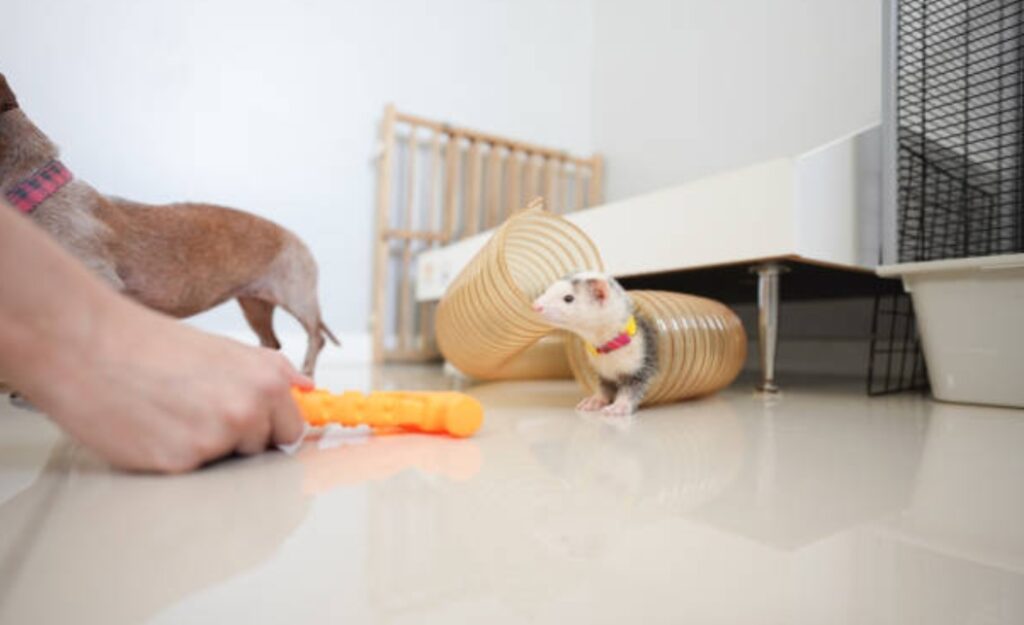
Ferrets are intelligent animals that can be trained using positive reinforcement techniques. In this section, we will cover these training techniques and the importance of socializing your ferret with other pets and people.
Positive Reinforcement Training Techniques
Positive reinforcement training techniques involve rewarding your ferret for good behavior with treats, toys, and praise. This type of training can be used to teach your ferret basic commands such as “come,” “stay,” and “roll over.”
How to Train a Ferret: Effective Ferrets Training Tips and Tricks
It’s important to keep training sessions short and consistent and to never use physical punishment or negative reinforcement. By using positive reinforcement techniques, you can help your ferret learn new behaviors and strengthen your bond with them.
Socializing with Other Pets and People
Ferrets are social animals that enjoy interacting with other pets and people. It’s important to socialize your ferret from a young age to prevent fear and aggression towards unfamiliar animals and people.
Socializing your ferret can involve supervised playtime with other pets, such as cats and dogs, as well as regular interaction with different people. It’s important to monitor these interactions and intervene if necessary to prevent any aggressive behavior.
Legal Considerations
Before bringing a ferret into your home, it’s important to research the laws and regulations surrounding ferret ownership in your area. In some places, ferrets are considered exotic pets and may require a special permit or license.
Additionally, it’s important to check with your landlord or housing association to ensure that keeping a ferret is allowed in your home or apartment.
Ferret-Proofing Your Home
Ferrets are curious animals that love to explore their surroundings. It’s important to ferret-proof your home to prevent accidents and injuries.
Some important steps to take when ferret-proofing your home include securing electrical cords, removing toxic plants, and ensuring that any small objects or choking hazards are out of reach.
Additionally, it’s important to supervise your ferret when they are out of their cage to prevent them from getting into mischief.
Common Questions and Answers
- What are ferrets?
- A: Ferrets are small, carnivorous mammals that are often kept as pets.
- What do ferrets look like?
- A: Ferrets have long, slender bodies with short legs and tails. They typically have brown, white, or black fur.
- What kind of personality do ferrets have?
- A: Ferrets are energetic and playful animals that are known for their mischievous behavior. They are also very social and enjoy interacting with their owners.
- What do ferrets eat?
- A: Ferrets are obligate carnivores and require a diet that is high in protein and fat. They can be fed a variety of commercially available ferret foods or a raw meat diet.
- How should I care for my ferret?
- A: Ferrets require a clean and comfortable living space, a healthy diet, regular exercise and playtime, and regular grooming and hygiene practices.
- What are some common health issues that ferret face?
- A: Ferrets are prone to a variety of health issues, including dental disease, adrenal gland disease, and gastrointestinal problems.
- Can ferrets be trained?
- A: Yes, ferrets can be trained using positive reinforcement techniques. They can also be socialized with other pets and people.
- Are ferrets legal as pets?
- A: Ferret ownership laws vary by state and country. Some areas prohibit owning ferrets as pets, while others require permits or licenses.
- How do I ferret-proof my home?
- A: Ferret-proofing involves making sure your home is safe and secure for your pet. This may involve blocking off certain areas or removing potentially hazardous objects.
- Where can I find more resources about ferret care?
- A: There are many resources available for learning about ferret care, including books, websites, and local ferret clubs or organizations.
Conclusion of Ferrets as Pet
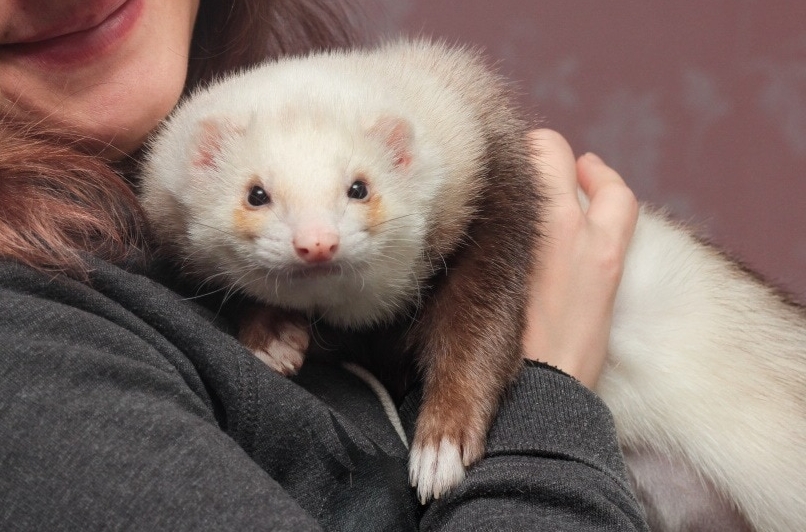
As we conclude this ultimate guide to understanding your furry friends, we hope that you have gained a better understanding of ferrets and their care needs. Ferrets can make wonderful pets for the right owner, but it’s important to remember that they require a lot of time, attention, and care.
Recap of Key Takeaways
Ferrets are intelligent, social, and playful animals that make great pets for the right owner. They require a lot of attention and care, including a balanced diet, exercise, and a safe living environment. Ferrets also need regular veterinary check-ups to maintain their health.
Positive reinforcement training techniques can help to establish a strong bond between you and your ferret. It’s important to supervise your ferret and make sure your home is ferret-proofed to prevent accidents and injuries.
Remember to always seek veterinary care if you notice any signs of illness or injury, and to continue learning about ferret care to ensure that you’re providing the best possible care for your furry friend.
Do you know! Why Do Ferrets Stink: Effective Odor-Free Management for Ferrets?
We would love to hear from you! If you have any questions, comments, or personal experiences with ferrets that you’d like to share, please feel free to leave a comment below. We welcome all feedback and would love to hear your thoughts on this ultimate guide to understanding your furry friends. Don’t hesitate to join the conversation and share your own knowledge and insights!
